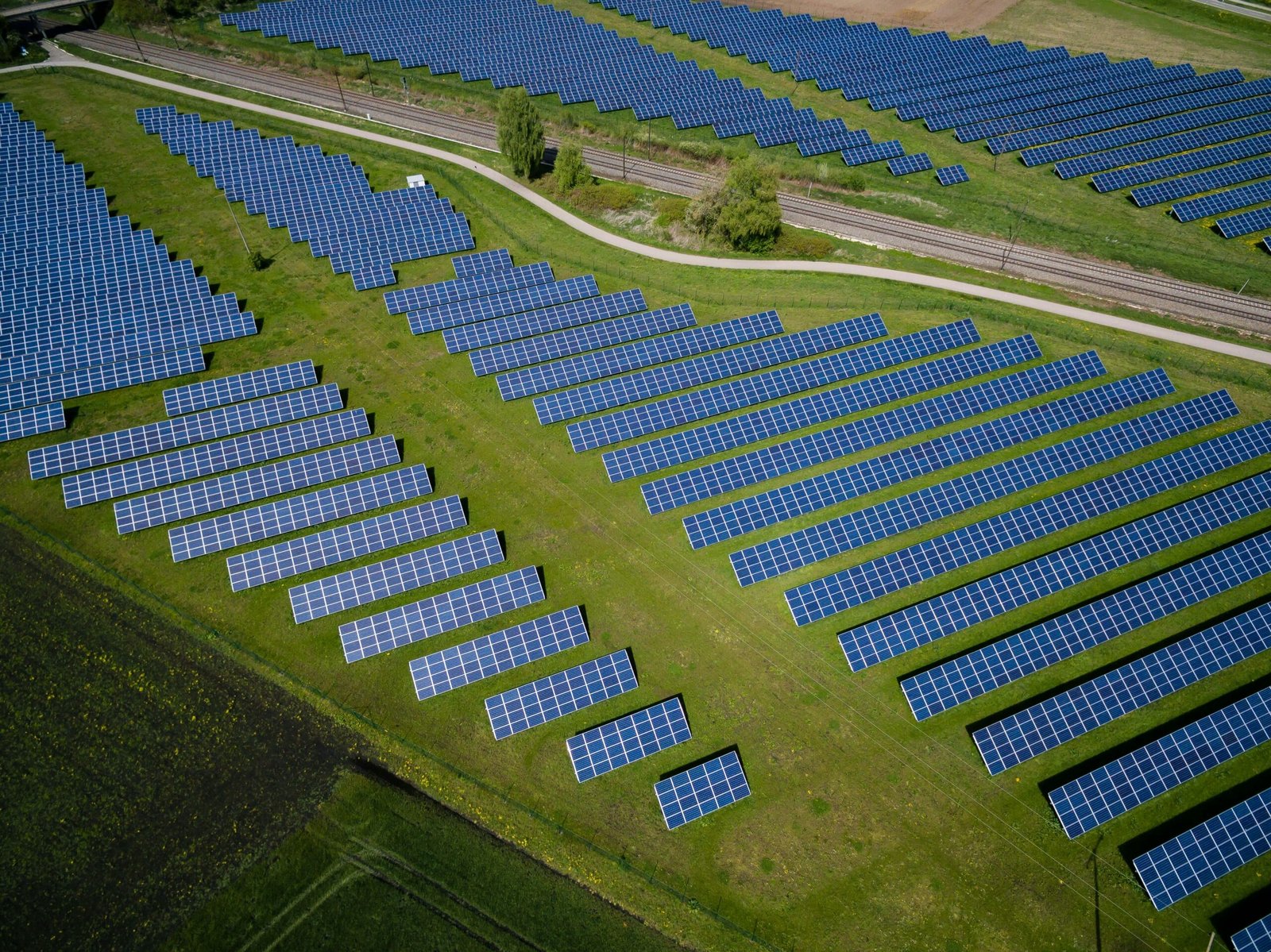
Photo by <a href="https://unsplash.com/@draufsicht" rel="nofollow">Andreas Gücklhorn</a> on <a href="https://unsplash.com/?utm_source=hostinger&utm_medium=referral" rel="nofollow">Unsplash</a>
The Growing Importance of Renewable Energy Technologies
As the world grapples with the challenges of climate change and the need for sustainable solutions, renewable energy technologies have emerged as a crucial part of the global energy landscape. These clean energy sources, such as solar energy and wind energy, offer numerous benefits over traditional fossil fuels, including reduced greenhouse gas emissions, improved air quality, and energy independence.
Investing in renewable energy has not only become a moral imperative but also a smart financial decision. The renewable energy sector presents a wealth of investment opportunities that can deliver both environmental and financial returns. In this article, we will explore the latest developments in renewable energy technologies and highlight the investment strategies that can help you capitalize on this growing sector.
The Rise of Clean Energy
Clean energy, also known as sustainable energy or green energy, refers to energy sources that have minimal negative impact on the environment. Unlike fossil fuels, which are finite and contribute to climate change, clean energy sources are renewable and produce little to no greenhouse gas emissions during operation.
The two most prominent forms of clean energy are solar energy and wind energy. Solar energy harnesses the power of the sun through the use of photovoltaic (PV) panels, while wind energy utilizes wind turbines to convert wind into electricity. Both technologies have experienced significant advancements in recent years, leading to increased efficiency and cost-effectiveness.
One of the key drivers behind the rise of clean energy is the decreasing cost of renewable energy technologies. Over the past decade, the cost of solar panels has dropped by more than 80%, making solar energy increasingly competitive with traditional sources of electricity. Similarly, the cost of wind turbines has also declined, making wind energy a viable option for many regions around the world.
Furthermore, governments and international organizations are recognizing the importance of clean energy in combating climate change. Many countries have set ambitious renewable energy targets and implemented supportive policies to incentivize the adoption of renewable energy technologies. These policy measures, such as feed-in tariffs and tax incentives, have helped drive investment in the renewable energy sector.
Investment Opportunities in Renewable Energy
Investing in renewable energy offers a range of opportunities for individuals and institutions looking to diversify their portfolios and support sustainable initiatives. Here are some key investment avenues in the renewable energy sector:
1. Renewable Energy Projects
Investing directly in renewable energy projects, such as solar farms or wind farms, allows investors to participate in the generation and distribution of clean energy. These projects typically offer long-term contracts, known as power purchase agreements (PPAs), which provide a stable and predictable revenue stream for investors.
Renewable energy projects can be developed by independent power producers or utility companies. Investing in such projects not only offers financial returns but also contributes to the growth of clean energy infrastructure and reduces reliance on fossil fuels.
2. Renewable Energy Funds
For investors looking for a diversified approach to renewable energy investments, renewable energy funds provide an attractive option. These funds pool together capital from multiple investors and allocate it to a portfolio of renewable energy projects.
Renewable energy funds can be managed by specialized investment firms or offered by traditional asset management companies. These funds offer investors the opportunity to access a diversified portfolio of renewable energy assets, reducing the risk associated with investing in individual projects.
3. Environmental Investments
Renewable energy is just one aspect of the broader field of environmental investments. Environmental investments encompass a range of sectors, including clean technology, sustainable agriculture, and water conservation.
Investing in environmental funds or companies involved in sustainable practices can provide exposure to multiple areas of environmental impact. This approach allows investors to support a broader range of sustainable initiatives while potentially benefiting from the growth of the renewable energy sector.
Energy Innovation and Market Trends
The renewable energy sector is characterized by rapid innovation and technological advancements. As governments, businesses, and individuals increasingly prioritize clean energy, new opportunities for innovation and investment continue to emerge.
One of the key areas of innovation in renewable energy is energy storage. While solar and wind energy offer clean and abundant sources of electricity, their intermittent nature poses challenges for grid stability. Energy storage technologies, such as batteries and pumped hydro storage, help address this issue by storing excess energy for use during periods of low renewable generation.
Advancements in energy storage not only improve the reliability of renewable energy but also open up new investment opportunities. Investing in companies involved in energy storage technologies can provide exposure to a rapidly growing market segment within the renewable energy sector.
Another emerging trend in the renewable energy market is the integration of artificial intelligence (AI) and data analytics. AI-powered systems can optimize the performance of renewable energy assets by predicting weather patterns, optimizing energy production, and improving maintenance strategies.
Investors can capitalize on this trend by investing in companies that develop AI and data analytics solutions for the renewable energy sector. These technologies not only enhance the efficiency of renewable energy assets but also enable better decision-making and risk management for investors.
Sustainable Investing and Energy Investment Strategies
Investing in renewable energy is just one aspect of sustainable investing, which seeks to generate positive environmental and social impact alongside financial returns. Sustainable investing considers environmental, social, and governance (ESG) factors in investment decision-making.
When it comes to energy investment strategies, there are several approaches that investors can consider:
1. ESG Integration
ESG integration involves incorporating environmental, social, and governance factors into the traditional investment analysis process. This approach allows investors to identify companies with strong sustainability practices and assess their long-term viability.
For renewable energy investments, ESG integration can involve evaluating companies based on their carbon footprint, renewable energy capacity, and commitment to sustainable business practices. By investing in companies with strong ESG performance, investors can align their portfolios with their values and support the transition to a low-carbon economy.
2. Impact Investing
Impact investing aims to generate measurable social and environmental impact alongside financial returns. This approach involves investing in companies, organizations, or projects that address specific sustainability challenges, such as climate change or energy poverty.
Within the renewable energy sector, impact investing can involve supporting projects that bring clean energy to underserved communities, promote energy access in developing countries, or drive innovation in renewable energy technologies.
3. Thematic Investing
Thematic investing focuses on specific investment themes or trends. In the context of renewable energy, thematic investing can involve targeting companies that are leaders in the development or deployment of renewable energy technologies.
Thematic investors may also focus on specific sub-sectors within the renewable energy industry, such as solar energy or energy storage. This approach allows investors to capitalize on the growth potential of specific areas within the renewable energy sector.
Conclusion
The renewable energy sector presents compelling investment opportunities for those looking to support sustainable initiatives while potentially earning attractive financial returns. The rise of clean energy, driven by advancements in renewable energy technologies and supportive government policies, has created a favorable investment environment.
Investors can explore various avenues in the renewable energy sector, including direct investments in renewable energy projects, participation in renewable energy funds, and broader environmental investments. Staying informed about the latest market trends, innovations, and investment strategies is key to making informed investment decisions.
By aligning investment portfolios with renewable energy and sustainable investing principles, individuals and institutions can contribute to the global transition to a cleaner and more sustainable energy future.



